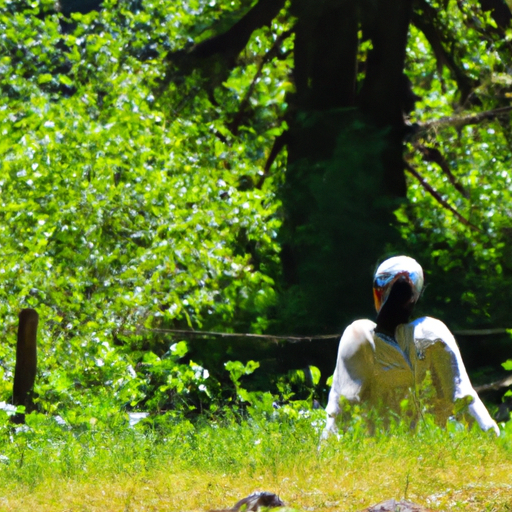Imagine taking a moment to sit comfortably, closing your eyes, and being gently guided through a world of tranquility and self-discovery. This is the essence of guided meditation, a powerful tool that can not only help us find inner peace, but also foster a deep sense of connectedness and belonging. In a world that sometimes feels overwhelming and disconnected, guided meditation offers a haven where we can reconnect with ourselves and the world around us, reminding us that we are not alone. By focusing our attention and exploring the depths within, we can unlock a profound sense of belonging that transcends physical boundaries and brings us closer to a sense of oneness with all living beings. Through this article, we will explore the transformative power of guided meditation and how it can support our inherent need for connectedness and belonging.
What is guided meditation?
Definition of guided meditation
Guided meditation is a practice that involves a guide, usually in the form of a recorded voice or a live instructor, leading you through a meditation session. Unlike traditional meditation, where you meditate in silence or with the help of soothing music, guided meditation provides verbal instructions and prompts, helping you navigate through the practice and focus your mind. It is a form of meditation that is particularly helpful for beginners or those who find it challenging to meditate on their own.
Purpose of guided meditation
The purpose of guided meditation is to help you relax, reduce stress, and cultivate a sense of peace and calm. It can also serve as a tool to enhance self-awareness, promote personal growth, and improve overall well-being. Guided meditation allows you to quiet your mind, connect with your inner self, and gain clarity and insights. But beyond these individual benefits, guided meditation also has the power to support a sense of connectedness and belonging.
Importance of connectedness and belonging
Why connectedness and belonging matter
Connectedness and belonging are essential for human beings. We all have a deep-rooted need to connect with others, to feel a sense of belonging, and to be part of a community. When we have a strong sense of connectedness and belonging, we not only feel supported and valued but also experience improved mental and emotional well-being. It helps create a sense of purpose, meaning, and fulfillment in our lives.
Effects of lack of connectedness and belonging
On the other hand, a lack of connectedness and belonging can have detrimental effects on our mental, emotional, and even physical health. It can lead to feelings of isolation, loneliness, and dissatisfaction with life. When we feel disconnected, we may struggle with low self-esteem, higher levels of stress and anxiety, and an increased risk of developing mental health disorders. Therefore, fostering a sense of connectedness and belonging is incredibly important for our overall well-being.
The role of guided meditation in fostering connectedness and belonging
Creating a safe and inclusive environment
Guided meditation creates a safe and inclusive environment for individuals to explore their inner world and connect with others. The presence of a guide or instructor provides a sense of support and encourages participants to let go of their inhibitions. In this nurturing space, individuals can feel comfortable expressing themselves and sharing their experiences without judgment. This sense of safety and inclusivity helps foster a deeper connection and a sense of belonging.
Cultivating empathy and compassion
Guided meditation often includes practices that cultivate empathy and compassion, both towards ourselves and others. Through guided visualizations and prompts, we are encouraged to imagine ourselves in the shoes of others, to understand their experiences, and to cultivate a sense of compassion and kindness towards them. These practices help us develop a deeper understanding and connection with others, ultimately fostering a greater sense of connectedness and belonging.
Developing self-awareness and acceptance
Self-awareness is a fundamental aspect of fostering connectedness and belonging. Guided meditation promotes self-awareness by encouraging individuals to turn their attention inward and observe their thoughts, emotions, and sensations. By developing a deeper understanding of ourselves and accepting our strengths and weaknesses, we build a stronger foundation for connecting with others. When we can authentically show up as ourselves, we attract genuine connections and create a sense of belonging.
Building a sense of connectedness through guided meditation
Guided meditation as a tool for building relationships
Guided meditation can serve as a powerful tool for building and nurturing relationships. Practicing guided meditation with others creates a shared experience, deepening the bond between individuals. Whether it’s participating in a guided meditation workshop or simply meditating with a friend or loved one, the act of coming together and focusing on a common goal cultivates a sense of connectedness and strengthens the relationships in our lives.
Enhancing interpersonal connection
Guided meditation allows us to connect with others on a deeper level by fostering mindful and present-moment interactions. By practicing active listening and being fully present during guided meditation sessions, we develop stronger interpersonal connections. This deepened connection with others builds trust and understanding, resulting in a greater sense of connectedness and belonging.
Strengthening community bonds
Guided meditation can play a vital role in strengthening bonds within communities. Whether it’s a meditation group, a workplace wellness program, or a community-centered meditation event, the act of meditating together creates a sense of unity. Bridging the gap between individuals, guided meditation helps build a collective sense of purpose and encourages collaboration and support within the community, further enhancing the overall sense of connectedness.
Cultivating a sense of belonging through guided meditation
Fostering self-acceptance and self-love
Guided meditation provides a space for nurturing self-acceptance and self-love. Through practices that encourage self-compassion and self-care, we learn to embrace ourselves fully, including our imperfections and vulnerabilities. When we cultivate a strong sense of self-acceptance and self-love, we naturally feel a greater sense of belonging within our own lives and communities.
Providing a sense of purpose and meaning
Guided meditation can help us tap into our inner desires, passions, and values, providing us with a sense of purpose and meaning. As we explore our core values and align our actions with them, we gain clarity on what truly matters to us. This clarity not only helps us find our place and purpose in the world but also allows us to attract like-minded individuals and communities that align with our values, fostering a deep sense of belonging.
Creating a supportive community
Guided meditation often takes place in group settings, allowing individuals to share their experiences and support one another on their journey. This sense of community provides a safe and supportive environment where individuals can openly express themselves, seek guidance, and offer support to fellow meditators. This supportive community fosters a sense of belonging and offers a network of like-minded individuals who can accompany us on our path of personal growth and connection.
Guided meditation practices to support connectedness and belonging
Loving-kindness meditation
Loving-kindness meditation, also known as Metta meditation, is a practice that involves generating feelings of love, kindness, and goodwill towards oneself and others. By consciously directing positive intentions and compassionate thoughts towards ourselves and others, we cultivate a sense of connectedness and belonging. This practice helps build empathy, strengthens relationships, and fosters a deep sense of care and compassion within ourselves and towards others.
Gratitude meditation
Gratitude meditation is a practice that involves focusing on the things we are grateful for in our lives. By consciously acknowledging and appreciating the blessings, big and small, we create a positive mindset and cultivate a deeper sense of connection and belonging. Gratitude meditation helps shift our focus from what is lacking to what is present, fostering a sense of contentment, and strengthening our relationships with ourselves and others.
Compassion meditation
Compassion meditation involves cultivating feelings of compassion towards ourselves and others, especially those who are suffering. By recognizing and acknowledging the universal nature of suffering, we develop a deeper sense of empathy and interconnectedness. Compassion meditation helps break down barriers and fosters a sense of belonging by promoting kindness, understanding, and support towards all beings.
Forgiveness meditation
Forgiveness meditation is a practice that involves letting go of resentment, anger, and grudges towards ourselves and others. By consciously releasing negative emotions and cultivating forgiveness, we create space for healing and connection. Forgiveness meditation helps mend broken relationships, restore trust, and foster a sense of belonging by promoting empathy, compassion, and acceptance.
Incorporating guided meditation into daily life
Establishing a regular meditation practice
To incorporate guided meditation into your daily life, establish a regular meditation practice. Set aside dedicated time each day to engage in guided meditation. It can be as short as five minutes or as long as an hour, depending on your schedule and preference. Consistency is key when establishing a meditation habit, so commit to a specific time and place for your practice, and gradually increase the duration as you become more comfortable.
Exploring different guided meditation techniques
There are various techniques and styles of guided meditation available, catering to different needs and preferences. Explore different guided meditation techniques to find what resonates with you. Some common styles include body scan meditation, breath awareness meditation, visualization meditation, and mantra meditation. By trying different techniques, you can discover which ones help you feel more connected and foster a sense of belonging.
Finding guided meditation resources
There are many resources available to access guided meditations. Websites, meditation apps, YouTube channels, and meditation studios offer a wide range of guided meditation recordings and classes. Explore different resources to find instructors or recordings that resonate with you. Listen to sample guided meditations, read reviews, and seek recommendations to find reliable and high-quality resources that support your journey towards connectedness and belonging.
Combining guided meditation with other practices
Yoga and guided meditation
Combining yoga and guided meditation can enhance the benefits of both practices. Yoga incorporates physical movement, breathwork, and mindfulness, providing a holistic approach to well-being. Many yoga classes integrate guided meditation at the beginning or end of the practice, allowing you to deepen your mind-body connection and cultivate a sense of connectedness and belonging on and off the mat.
Mindfulness and guided meditation
Mindfulness and guided meditation go hand in hand. Mindfulness involves paying attention to the present moment with kindness and curiosity. Practicing mindfulness during guided meditation helps you stay focused and engaged in the practice, allowing you to deepen your connection with yourself and others. By cultivating mindfulness in your daily life, you can carry the principles of connectedness and belonging into your interactions and relationships.
Journaling and guided meditation
Journaling can complement guided meditation by allowing you to process your thoughts and emotions. After a guided meditation session, take a few moments to reflect on your experience and write down your insights and feelings. Journaling acts as a powerful tool for self-reflection and can further deepen your sense of connectedness and belonging by helping you gain clarity and understanding of your inner world.
Challenges in maintaining connectedness and belonging
Overcoming social barriers
Maintaining a sense of connectedness and belonging can be challenging due to social barriers such as isolation, prejudice, and discrimination. It is important to actively seek out inclusive communities, engage in activities that align with your values, and foster connections with like-minded individuals. By participating in guided meditation groups, workshops, or online communities that prioritize acceptance and inclusivity, you can overcome these barriers and cultivate a sense of connectedness and belonging.
Dealing with self-doubt and fear
Self-doubt and fear can hinder our ability to connect with others and feel a sense of belonging. Guided meditation can help you address these internal challenges by cultivating self-compassion, building self-confidence, and developing a greater sense of self-awareness. Through practices that encourage acceptance and letting go of limiting beliefs, you can overcome self-doubt and fear, allowing yourself to authentically connect with others and experience a deeper sense of belonging.
Addressing societal factors
Connectedness and belonging can also be influenced by societal factors such as cultural norms and systemic inequalities. Recognizing and challenging these factors is crucial in fostering a sense of connectedness and belonging for all individuals. By actively engaging in conversations and actions that promote inclusivity, equality, and social justice, we contribute to creating a more connected and accepting society where everyone can experience a true sense of belonging.
Conclusion
Guided meditation is a powerful practice that not only helps individuals cultivate inner peace and well-being but also supports a sense of connectedness and belonging. By creating a safe and inclusive environment, fostering empathy and compassion, and developing self-awareness and acceptance, guided meditation plays a significant role in promoting connectedness and belonging. Through practices like loving-kindness meditation, gratitude meditation, compassion meditation, and forgiveness meditation, individuals can deepen their sense of connection, strengthen bonds within communities, and cultivate a greater sense of belonging. By incorporating guided meditation into daily life and combining it with practices such as yoga, mindfulness, and journaling, individuals can enrich their journey towards connectedness and belonging. Despite challenges such as social barriers, self-doubt, and societal factors, guided meditation offers a path to overcome these obstacles and foster a deep sense of connectedness and belonging in our lives. So take a moment, find a comfortable seat, and let guided meditation guide you towards a deeper sense of connection, belonging, and overall well-being.
Hi, I’m the Editor of Daily Guided Meditation. Meditation is not just a practice for me, but a way of life. I believe in the power of mindfulness to bring peace and balance into our busy lives. That’s why I created this website, where you can find daily guided meditations to help you on your journey of self-discovery and inner peace. Join our community and experience the transformative benefits of mindfulness through soothing meditations, relaxation techniques, and valuable resources. Prioritize self-care and start your day with intention by exploring our website today. Together, let’s find serenity amidst the chaos.


